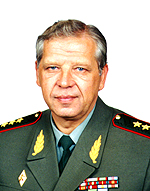
GUDAUTA BASE AND UNACCOUNTED-FOR TREATY-LIMITED EQUIPMENT: ONGOING RUSSIAN BREACHES OF CFE TREATY COMMITMENTS
Publication: Eurasia Daily Monitor Volume: 4 Issue: 118
By:

In a formulation reminiscent of Soviet five-year plan-fulfillment reports, senior Russian officials claim that Russia has completely “fulfilled and over-fulfilled” its 1999 treaty commitments to withdraw its forces from Georgia and Moldova. Defense Minister Anatoly Serdyukov and General Konstantin Totsky, Russia’s permanent representative at NATO, reiterated that claim during the June 14 session of the NATO-Russia Council (NRC) at the level of defense ministers in Brussels (Interfax, June 14).
The NRC chairman’s concluding statement (NATO Data Service, June 14) mentions only that the issue of the 1999 treaty was “discussed” — a one-word treatment indicative of deep differences that could be papered over. The NRC meeting overlapped with the June 11-15 extraordinary conference in Vienna on the implementation of the Treaty on Conventional Forces in Europe (CFE), the treaty that entails those Russian commitments. At the Vienna conference as well, Russia insisted that it has completely fulfilled them.
While the Vienna conference focused on the Russian troops in Moldova (the top issue among the unfulfilled commitments on troop-withdrawal), other unfulfilled commitments seem to receive less attention there. One such issue is that of Russia’s base at Gudauta in Georgia. The United States and other countries raised this issue in the closed-door conference and U.S. Assistant Secretary of State Daniel Fried, delegation leader at the conference, raised Gudauta publicly as well (State Department transcript, June 12).
As part of its 1999 commitments, enshrined in the CFE Final Act at that year’s Istanbul summit, Russia was to close the Gudauta base, evacuate the personnel and equipment, and hand the base over to Georgia by July 1, 2001. However, Russia retains the base to the present day, albeit with a reduced garrison.
According to data supplied by Moscow, some 400 Russians — about half of them active military personnel, the remainder being military retirees and dependents — are stationed at Gudauta, along with some combat and transport helicopters, various military vehicles, a fuel storage area, and some other facilities. That information remains largely unverified. Moscow has not allowed international inspection of the base and has provided no data on suspected stockpiles of arms and ammunition or the content of container-type structures at the base. The Russian military also clings to the Bombora airfield, which is part of the Gudauta base complex.
Gudauta is located inside Abkhaz-controlled territory, where Moscow can hide behind its proxies to frustrate international inspection of the base. In this vein, Russia has periodically claimed that it is up to Georgia to guarantee the safety of any international arms control team that would wish to inspect Gudauta. At the same time, Moscow has plainly been stating that it would allow an inspection under OSCE aegis provided that it concludes that the base is “closed.”
In the last three years, German diplomacy has attempted to promote some kind of compromise solution over Gudauta. A tripartite group of Germany, Russia, and Georgia has negotiated intermittently within the OSCE over the modalities of an observation mission at the base. Moscow has sought a one-time, non-intrusive inspection, with Moscow-vetted participation, without a follow-up process, and predetermined to close the issue. For its part, Tbilisi seeks modalities for a genuinely international observation mission and a continuing observation process, in accordance with the CFE Treaty’s verification procedures.
Georgia will regard Gudauta as closed when multinational observation missions with unrestricted access confirm the complete evacuation, and the base and other facilities are transferred to Georgia in a legal sense (a physical transfer would be precluded by Abkhaz de facto control of the surrounding area). NATO allies support Georgia’s position and did so again at the Vienna conference. At the same time, Georgia and its Western partners expressed appreciation for the ongoing withdrawal of Russian forces from the Batumi and Akhalkalaki bases. As Minister of Foreign Affairs Gela Bezhuashvili noted in Vienna, the withdrawal is being carried out in accordance with the agreed schedule (Georgian Mission statement, June 14).
The problem of Unaccounted-For Treaty-Limited Equipment (UTLE) is closely connected with the secessionist conflicts in Transnistria, Abkhazia, South Ossetia, and Karabakh. Treaty-Limited Equipment (TLE) is the overall category of weaponry that falls under CFE Treaty restrictions (whether numerical limits under national or territorial quotas; or mandatory scrapping; or removal to Russia, from case to case). UTLE is the official, euphemistic designation of TLE-types of weaponry held by secessionist forces.
Those unlawful forces possess combat hardware — including armored vehicles, artillery systems, and helicopters — that fall under CFE Treaty restrictions. The Russian military handed those arsenals over to secessionist authorities on the territories of Moldova and Georgia. The Armenian military did so in the territory of Azerbaijan, where part of the UTLEs is located beyond Karabakh, deep inside Azerbaijan. Consequently, Armenia has found it inexpedient to campaign for ratification of the 1999 CFE Treaty even as allied Russia does so.
Those arsenals are “unaccounted-for” because the areas of deployment are under Russian and secessionist control, inaccessible to on-site verification and inspection.
The CFE Treaty (both the 1990 original in force and its unratified 1999 adaptation) provides for an elaborate inspection mechanism by the state-parties, but this is not allowed to operate in any of the secessionist enclaves. The presence of those arsenals generates military tensions, constitutes a major impediment to political settlements of those conflicts, and deals a major breach to the international verification regime.
Russia cannot be deemed to have fulfilled the terms of the CFE Treaty and Istanbul Commitments as long as the problems of the Gudauta base and the UTLEs remain unresolved.




